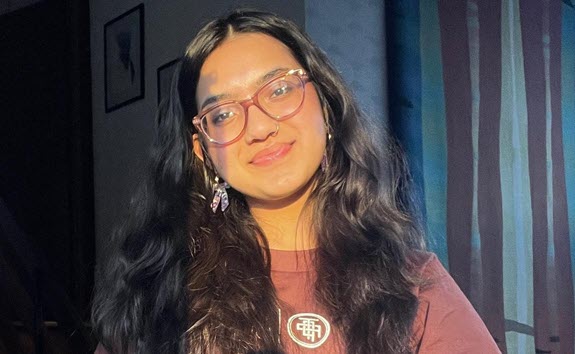Safiyya
BA (Hons) Combined Honours
I always wished that I had someone who could point me in the right direction, and I figured being a Peer Mentor would allow me to be that person for someone else because even a little help at that point can be invaluable.
Being a Peer Mentor
As an international student from Tanzania, the transition to university was a massive shift and quite difficult - it had an impact on my physical, emotional, and mental wellbeing. It was also a massive culture shock. Everything here is really different to back home where everything is so familiar and I had to start from scratch - making friends, learning the lay of the land, developing my own lifestyle and the hardest part was just knowing where to start. I always wished that I had a guiding hand or someone who could just point me in the right direction now and then, and I figured being a Peer Mentor would allow me to be that person for someone else because even a little help at that point can be invaluable.
As a Peer Mentor, I tried to figure out what help my mentees needed most and did what I could to provide that. We met several times outside of the induction period over the first semester, and each meeting had a different purpose based on their needs. For the first meeting, we made a list of all the classrooms that the mentees had classes in and went on a tour together to each room, I pointed out the cafes and student lounges on the way to help them get familiar with the university and reduce the first-week lateness from having no clue where you are! The other sessions were based on academic support, exploring university resources, and reflective activities to help measure their progress and set goals for the year.
What mentees will receive depends on the mentor they have. Everyone has a different level of investment and style of collaborating. For the most part though, all Peer Mentors are pretty nice people and want to help their mentees so they can expect a friendly face who's willing to share advice, support, and guide them even a little bit through this major transition.

Benefits of being a Peer Mentor
Peer Mentoring is a great opportunity that helps you develop and practice so many valuable skills. Firstly, communication. From attending training sessions, induction week events, organising meetings with the mentees, and check-ins with your senior mentors and staff, you really get to develop your inter-personal skills, collaborating with several different people, communicating efficiently to organise everything, and connecting professionally with one another. Secondly, organisational skills. Peer Mentors have to organise their meetings with their mentees and you get pretty organised figuring out the location and timings that work for everyone, and also planning the content of the meetings. You also become more creative, develop your leadership skills, confidence, time-management, and reflective skills because a big part of the job is looking back at your experiences and lessons and passing those on to your mentees.
To someone considering being a Peer Mentor, I’d say do it! It might sound like a lot of work, but it genuinely isn't. Training and induction might take up a few hours during the induction period but they're usually fun - you get to make new friends, get free coffee and cake (depends on your faculty - go Combined Honours!!) and really grow as a person. and then you only meet your mentees a few times during the first semester – so really, you're putting in a small number of hours for something pretty social and super rewarding. Go ahead and do it, if nothing else, do it so you can be that helping hand you wished you had when you felt a bit lost in first year and heal that part of yourself :) My favourite part of it is that I got to really become part of the Combined Honours community and feel connected - like I was here for the community and people of Combined Honours as much as they were for me.
I am so so grateful that my mentees nominated me for Peer Mentor of the Year. It was enough to find out that I was shortlisted because it meant so much that my mentees appreciated the work I put in enough to actually go and nominate me. I was so touched by that. Winning the award was just a massive bonus. I got to sit with my fellow Combined Honours members, who were super supportive and who I've grown fairly fond of over the course of my mentoring experience, and it was great to represent Combined Honours by bringing it home for our programme and community.